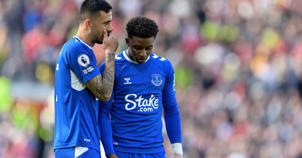- Clubs in the Premier League will not feature gambling firms on the front of matchday shirts from the end of the 2025/2026 season
- Gambling campaign groups said it was significant in acknowledging the harms caused by gambling addiction.
- However, they said the move does not go far enough given firms could potentially advertise on shirt sleeves and gambling ads are prominent in football TV broadcasts and around pitches.

© Provided by CNBC Dwight McNeil (L) and Demarai Gray of Everton during the Premier League match between Manchester United and Everton FC at Old Trafford on April 08, 2023 in Manchester, England. The club’s shirts are sponsored by online casino Stake.com.
Soccer clubs in England’s top-flight Premier League on Thursday agreed not to allow gambling firms to advertise on the front of matchday shirts from the end of the 2025/2026 season.
The move comes amid widespread concern and ongoing campaigns to reduce or ban gambling advertising.
It is the first U.K. sports league to voluntarily make the move, although it will still be possible for clubs to advertise gambling brands on shirt sleeves and on pitch-side hoardings.
The shirts of eight out of 20 teams in the Premier League are sponsored by gambling firms in the current season, including Everton’s £10 million ($12.5 million) per season deal with online casino Stake.com and Southampton’s reported £7.5 million a year deal with Sportsbet.io.
Some betting firms use clubs to advertise to non-European markets, with Fulham currently sponsored by Asia’s W88 and Everton previously sponsored by Kenya’s Sportpesa.
Club shirt sponsorships were worth £350 million overall in the 2019-20 season, according to a Statista estimate, with around £60 million coming from gambling firms.
Gambling advertising is hugely prominent in other sponsorship areas, including TV adverts before, during and after matches and stadium banner advertising. For example, Stoke City, which is currently in the second-tier English league, plays in the Bet365 stadium.
Campaign groups called the move significant in acknowledging harms caused by gambling but said it fell well short of addressing this, including because the move only covers the front of shirts and not shirt sleeves. The Premier League did not immediately respond to a request for comment.
“Just moving logos to a different part of the kit while allowing pitch-side advertising and league sponsorship to continue is totally incoherent,” said James Grimes, founder of campaign group The Big Step, which calls for all gambling ads to be banned from football.
“Without government action on all forms of gambling ads in football, at every level, online casinos will exploit any voluntary measures and continue to market their products through our national sport.”
Government set to tighten regulation
Campaign groups have consistently flagged the significant harms caused by gambling addiction in the U.K. and beyond, while online betting rocketed in popularity during the coronavirus pandemic lockdowns.
The U.K. government is due to publish a report on the regulation of the gambling sector before the end of the month, though it has been frequently delayed. Sports advertising is reported to have been a particular point of contention in its recommendations.
The Premier League’s move comes after a years-long government consultation into soccer’s financing and future, which confirmed plans to set up an independent regulator to oversee various parts of the game, including sponsors. Another area of concern is the takeover of clubs by individuals or entities accused of human rights violations.
However, the Premier League is thought to be resistant to a regulator and has been making efforts to show it can oversee itself.
In February, it referred Manchester City, which according to a Deloitte survey is the world’s highest revenue-generating soccer club, to an independent commission over allegations it breached several of the league’s financial rules.
The club told the BBC in a statement at the time that it was surprised by the charges, adding it was supported by a “comprehensive body of irrefutable evidence.”